Julius Sterling Morton was born in the state of New York, on April 22, 1832, to Julius Dewey and Emeline Sterling Morton. J. Sterling, as he came to be known, was the eldest of three children. Morton’s father operated a general store, but in 1834 decided to try his business fortunes farther west and moved the family to Michigan where he became a prosperous produce commission businessman.
Morton obtained his early education in a private school and attended Wesleyan Seminary in Albion, Michigan where he remained until 1850 when he entered the University of Michigan, but received his Bachelor of Arts degree from Union College in Schenectady, New York. He worked for a while as a reporter for the Detroit Free Press, following in the footsteps of his uncle and grandfather, both of whom were newspaper publishers.
In 1854, he married Caroline Joy French in Detroit, Michigan. She had been his high school sweetheart. They would have four sons named Joy, Paul, Mark, and Carl. Immediately after marriage, the young couple left for Nebraska Territory, stopping for a winter in Bellevue, before moving to Nebraska City in April 1855, where Morton accepted the editorial duties of the Nebraska City News.
In Nebraska, J. Sterling Morton began his political career. He was an uncompromising conservative Democrat. In 1858, President James Buchanan appointed Morton Secretary of the Nebraska Territory, and twice served as acting governor. He was a candidate for delegate to Congress in 1860 and received a certificate of election from the governor. However, Morton was never allowed to take his seat in the U.S. House of Representatives as his election was contested in the overwhelmingly Republican House. This was the beginning of a series of political defeats for the Democrat from the North during and after the Civil War.
During the years between 1867 and 1882, Morton dropped out of politics and turned his attention to the quarter section of land on which he made his home. He focused on the planting of trees and experimented with various types of forest and fruit trees. He attempted to find varieties that would do best in the soil and the climate of Nebraska. Morton felt the Nebraska prairie would benefit through trees because they would provide lumber, fruit, and windbreaks, as well as hold the moisture in soil.
For many years Morton was president of the Nebraska State Board of Agriculture and a member of the state Horticultural Society. He used both positions to fervently advocate for improved agriculture, and was most enthusiastic in his praise of tree planting.
President Grover Cleveland appointed Morton U.S. Secretary of Agriculture in 1893. He served in Washington D.C. until he returned for Nebraska City four years later. In “retirement” he started a new newspaper called the Conservative and wrote a history of Nebraska.
J. Sterling Morton built a fifty-two-room mansion that is a look-alike of the White House in Nebraska City. On the surrounding estate, Morton planted many rare varieties and heirloom apple trees.
Morton died in 1902 at the home of his son, Paul. A special train brought the body From Chicago, Illinois to Nebraska City. Following Morton’s death, the family donated the Nebraska City homestead to the state of Nebraska. The estate is now preserved as the Arbor Lodge State Historical Park.



